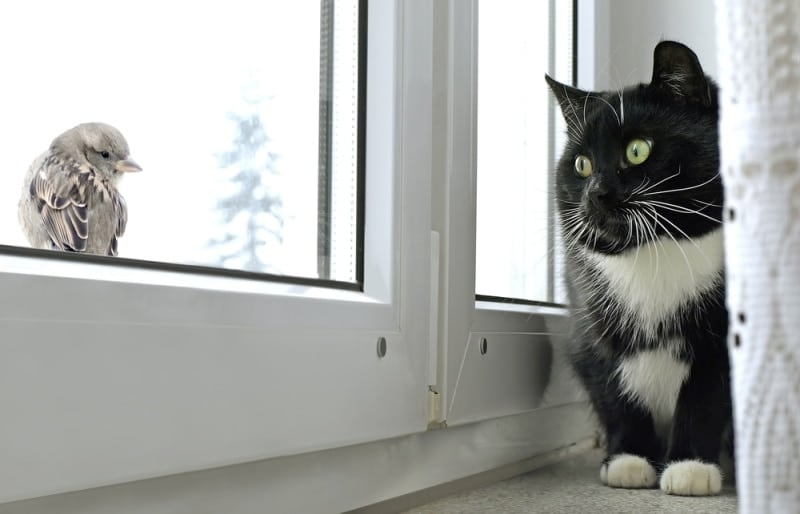Click to Skip Ahead
Your cat may seem like a cuddly ball of fur or even a hairless wonder who loves to spend time with you under the blankets, but something changes when your feline sees a bird outside the window. Instantly, your kitty goes on the prowl. They’ll be seated in the window, peering at the unsuspecting bird and chirping.
Yes, we said chirp. Most cat parents have witnessed it, but those unfamiliar with cats may not necessarily believe it. Cats are supposed to meow, but it’s common for your kitty to chirp when they see a bird. You should even encourage it. The big question is, why does your cat chirp?
Let’s take a look at 5 common reasons for this behavior in cats so you can better understand your kitty pal and admire their vocalizations when a bird or other small prey animal is around.
The 5 Reasons Why Cats Chirp at Birds
1. Mimicking the Bird
While they may not look like it, cats are natural-born hunters. To make hunting easier, it’s believed that the chirping sound of cats when they see a bird is a form of mimicking. This type of trickery is often used in the wild to entice the prey to move closer. Now, your housecat can’t get to the birds they see outside.
That doesn’t mean their instincts aren’t going to kick in anyway. If big cats in the wild try to trick their prey, why shouldn’t your feisty feline? Allowing this to happen is a great way to let your cat feel like they are on the hunt.
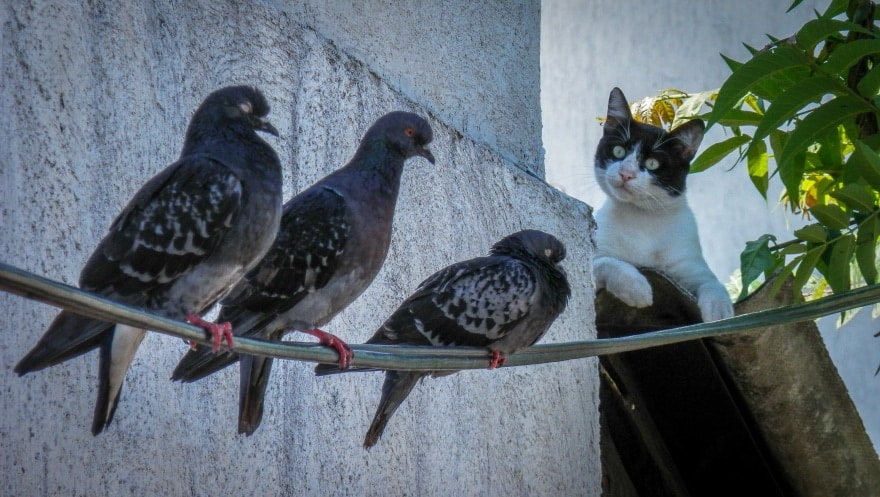
2. It’s All About Excitement
What cat parent doesn’t like to see their kitty excited about something? This is especially true if the tiny carnivore in your home prefers lounging around instead of being active. It’s possible that the chirping coming from your cat when they spot a bird outside the window is all about that excitement.
Seeing a bird can make your cat’s mouth water or teeth chatter. The excitement your cat feels at the potential of snatching prey could be garnering an involuntary reaction that, without the prey in their mouth, results in a chirping sound.
3. A Frustrated Kitty
Your indoor cat could be chirping at the birds outside the window out of frustration. But don’t let that worry you. The chirping you hear from your little hunter could be their frustration over being unable to leap from the window to chase the prey they’ve spotted. If that is the case, it’s completely normal and won’t hurt your cat’s psyche. They’ll still feel like they are the king or queen of the house after the bird takes off.
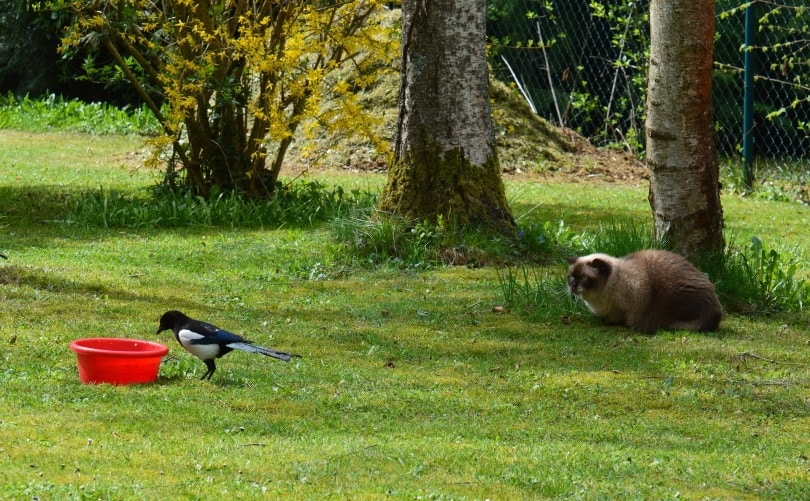
4. The Prey Sequence Has Been Activated
As the pet parent to a house cat, you may be unaware of the prey sequences your kitty and big cats experience in the wild when on the hunt. The first step in this sequence is watching their prey with anticipation. During this process, the chirping sound often comes into play.
The next steps include the chasing or stalking of the prey, then the pounce, and finally, the killer bite. While your indoor cat may not participate in the entire sequence, it only makes sense that spotting a bird outside should at least get the ball rolling inside them.
5. Mimicking the Killer Bite
It’s believed that the chirping your kitty makes when spotting prey animals like birds isn’t always the first step of the prey sequence. Some experts and pet parents believe house cats may chirp to mimic the action of performing the killer bite cats use when they successfully take down their prey.
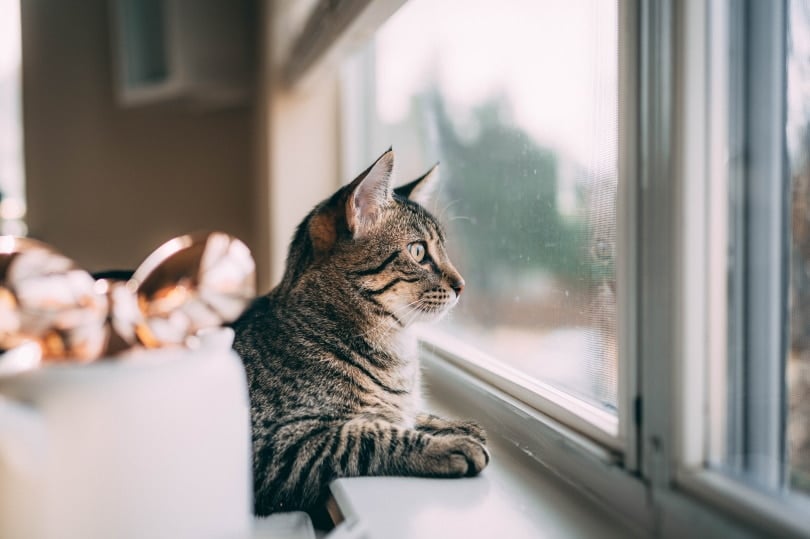
Is Chirping Something You Should Worry About?
While you may not love the idea of your cat sitting in the window daydreaming about killing a bird outside, it’s normal behavior for them. It allows your cat to follow their instincts and act like a cat in the wild. You may want to stop their behavior, close the blinds, or even redirect their attention, but you shouldn’t do it.
Keeping your cat from acting like a cat can make them anxious and stress them out. This can leave them with no outlet for pent-up energy. You may notice them become aggressive or frustrated with you, other people in the house, and even other pets.
It’s best to allow your cat to chirp and react when they see prey instead of trying to force them into acting in a way that isn’t natural. For a truly happy indoor cat, chirping at birds should be encouraged.
How to Encourage Your Cat’s Natural Chirping Instinct
If you enjoy seeing your cat reacting to birds and other small animals outside, there are a few ways you can encourage their prey drive and initiate the sequence at home.
- Provide a safe place to view the outdoors
- Play with your cat several times a day, especially before meals
- Use chaser and wand toys to promote your cat’s hunting skills
- Use engaging food puzzles to stimulate your cat’s mind at feeding times
By implementing these tips into your cat’s daily life, they can feel more like the natural hunter they are. This is an excellent way of helping them burn energy and avoid the frustration many cats may experience when they aren’t allowed to follow their instincts.
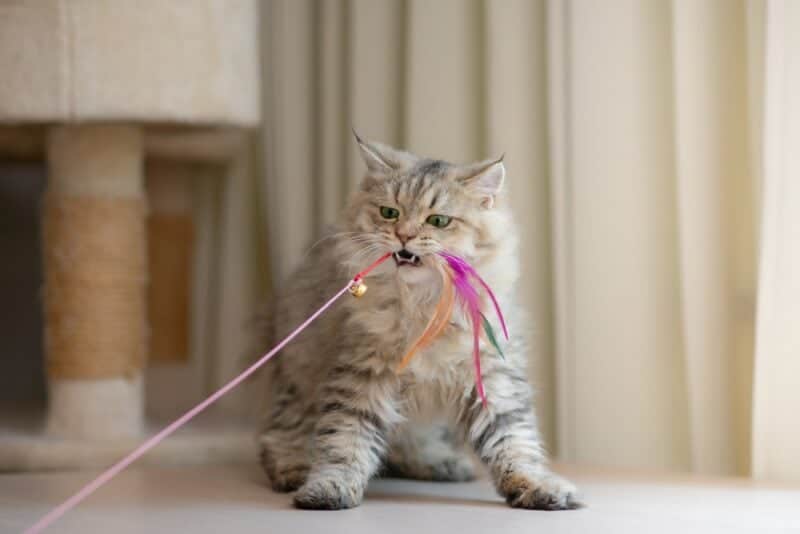
Conclusion
Cats chirping at birds outside is entirely natural and should be encouraged. It is one of the easiest ways to let your indoor kitty interact as they would naturally, without letting them outside. Instead of trying to stop your cat’s fun, sit back and enjoy the show. You may get a kick out of your kitty showing off the true hunter hiding inside.
Featured Image Credit: Andrzej Puchta, Shutterstock

